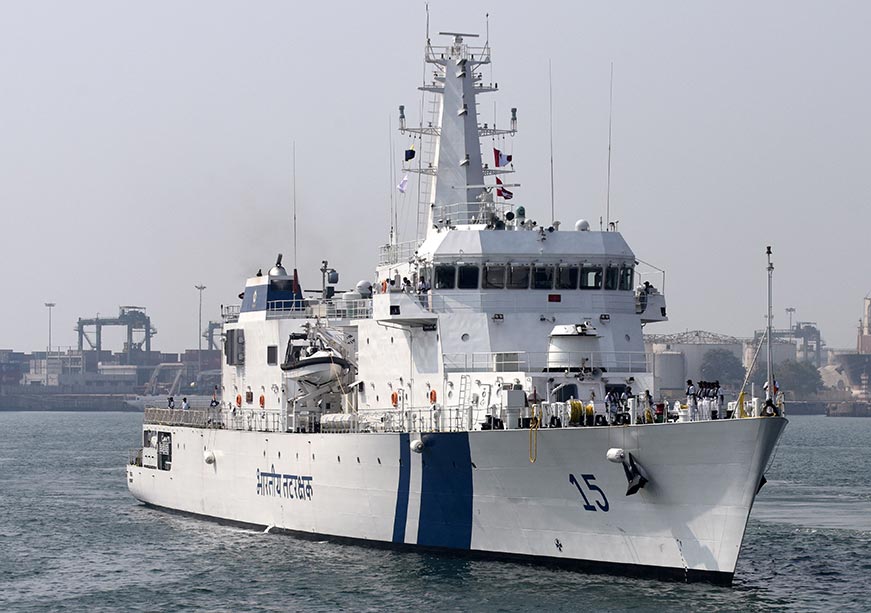-
CENTRES
Progammes & Centres
Location
India continues to be enthusiastic about the potential of the Quad in shaping a free, open, and inclusive rules-based order in the Indo-Pacific

Image Source: Getty
For long, India’s security outlook had remained constrained with a dominant land-locked view. This is largely attributed to the continued threats emanating from Pakistan and China that have sought to impinge on India’s territorial sovereignty.
However, since the beginning of the twenty-first century, New Delhi has steadily adopted a strategy to recalibrate its security thinking by prioritising its maritime periphery. Several internal and external factors have informed India’s changing security outlook. First, the Mumbai terror attacks in 2008, caused by the infiltration of terrorists through the Arabian Sea amply demonstrated the importance of maritime security for India’s broader national security interests. The incorporation of the Indian Coast Guard service into the Indian Navy marked efforts by New Delhi to streamline its maritime security approach.
The rising salience of the Indo-Pacific appeared to find alignment with India’s capacity and intent to play an increasingly vital role in the world.
Second, structural shifts following the onset of the Indo-Pacific as a singular strategic theatre posited India at the heart of the evolving strategic matrix in the region. The rising salience of the Indo-Pacific appeared to find alignment with India’s capacity and intent to play an increasingly vital role in the world.
In 2025, India will find itself in a unique place as it is poised to assume the chair of two important forums, the Indian Ocean Rim Association (IORA), and the Indian Ocean Naval Symposium (IONS). Additionally, India is also scheduled to host the Quad leaders’ summit in 2025 for the first time since the leader-level summits began in the group. In view of this, India seems perfectly placed to harness shared maritime interests and opportunities and contribute to norm-making in the maritime domain through these vital platforms.
Importantly, India’s role in mooting both IORA and IONS was critical. While IORA was initiated as an inter-governmental diplomatic forum to deliberate on common issues and challenges in the Indian Ocean security, IONS was conceived as a forum for regional navies to enhance cooperation on common issues of maritime security. The Quad, on the other hand, began with an agenda of humanitarian assistance and disaster relief (HADR), but soon after broadened its agenda to incorporate issues of delivery of developmental imperatives, such as health, technological cooperation, maritime domain awareness, etc.
Given that 2025 marks this pivotal moment in India’s political, diplomatic, and security engagement, and the evolving complexities emerging from wide-ranging challenges at sea, New Delhi must work towards an agenda that seeks to build synergies across maritime issues in the Indian Ocean. This appears to be necessary given the manifold challenges that are increasingly emerging in the Indian Ocean.
Regionalism in the Indian Ocean has suffered due to the vast geography of the region, differing security and strategic interests of resident countries, and lack of meaningful efforts in cooperation on issues of imminent interests and challenges.
The return of piracy in the Red Sea, compounding climate crises, maritime terrorism, drug and human trafficking are some key issues which require collective thinking and action. Regionalism in the Indian Ocean has suffered due to the vast geography of the region, differing security and strategic interests of resident countries, and lack of meaningful efforts in cooperation on issues of imminent interests and challenges.
However, cooperation in the Indian Ocean remains vital for India’s interests. With a growing emphasis on India’s maritime geography, challenges emanating from the oceans will require increasing attention. In pursuance of its own interest of playing the role of the principal security and development partner in the Indian Ocean, working towards growing the efficiency of IORA and IONS, and leveraging the Quad appear to serve as a fitting opportunity for India to ensure synergy and alignment of these forums in directing focus towards maritime challenges and opportunities.
Both IORA and IONS made progress during India’s previous tenure as chair. Notably, during India’s previous tenure as chair of IORA during 2011-2013, the forum adopted key priority areas that sought to streamline the organisational focus on the group. Similarly, India was a key architect in mooting IONS and hosted the first symposium in 2008 and was the first chair of the forum.
India continues to be enthusiastic about the potential of the Quad in shaping a free, open, and inclusive rules-based order in the Indo-Pacific.
India’s forthcoming tenure as chair of both the forums in 2025, coupled with the continued priority accorded to its maritime interests, New Delhi’s role in galvanising collective regional thinking in the Indian Ocean seems complementary. Furthermore, India continues to be enthusiastic about the potential of the Quad in shaping a free, open, and inclusive rules-based order in the Indo-Pacific. Given the complexities arising from incoming US President Donald Trump’s unpredictable style of diplomacy, New Delhi must continue to push for greater synergy in the Quad. Overall, the year 2025, appears to be poised to mark India’s maritime moment.
This commentary originally appeared in Hindustan Times.
The views expressed above belong to the author(s). ORF research and analyses now available on Telegram! Click here to access our curated content — blogs, longforms and interviews.

Sayantan Haldar is a Research Assistant at ORF’s Strategic Studies Programme. At ORF, Sayantan’s research focuses on Maritime Studies. He is interested in questions of ...
Read More +